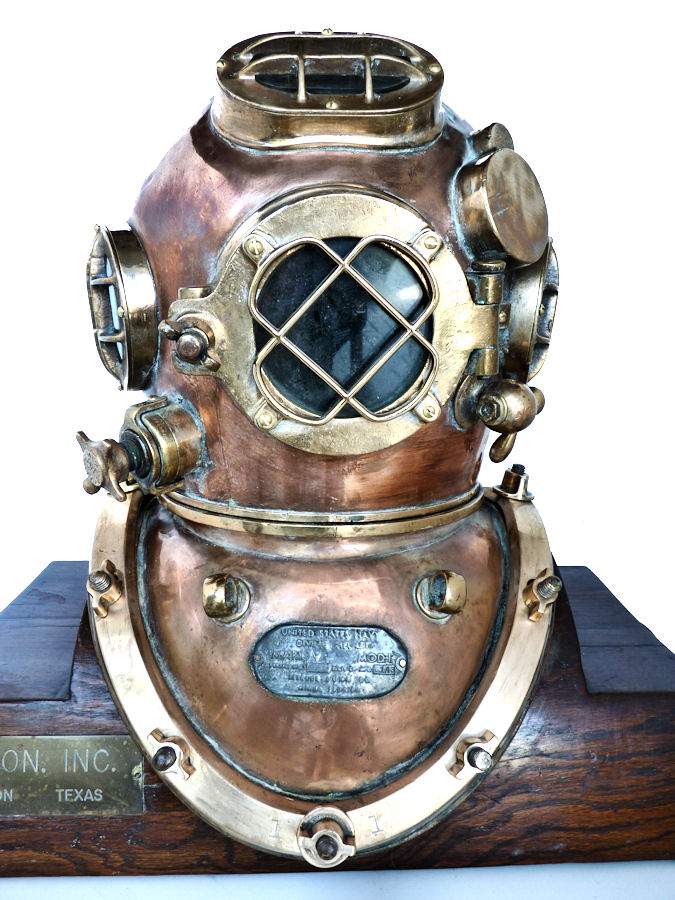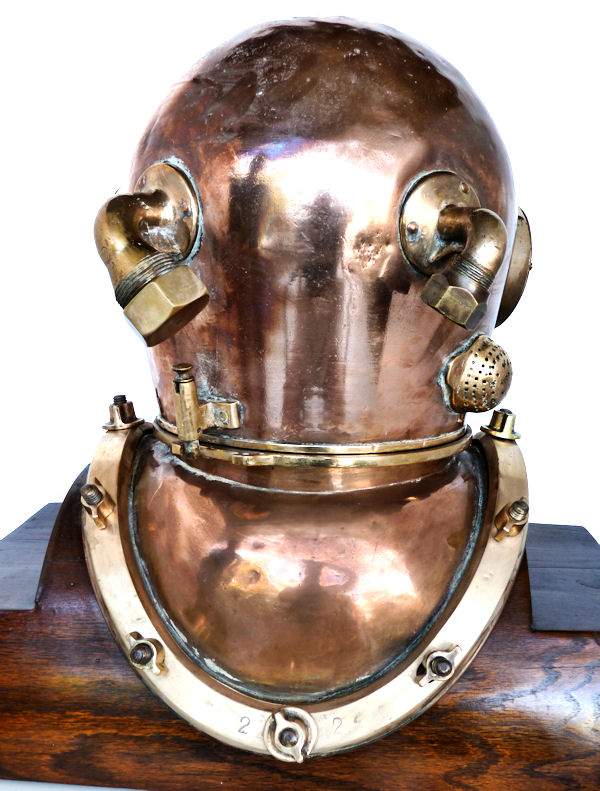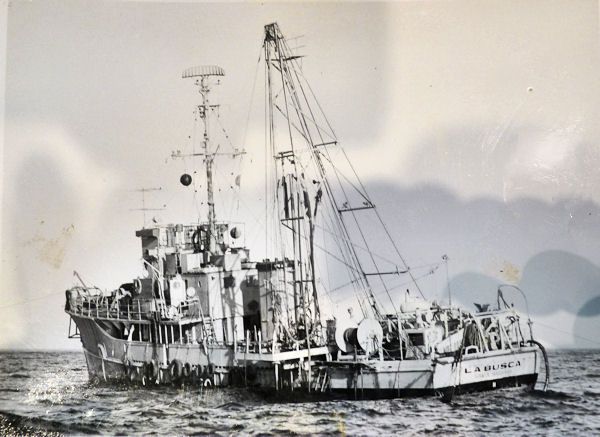

Miller-Dunn
Only Made 1200 MK V’sMURRAY D. BLACK, FOUNDER DIVCON INC.
COMMERCIAL DIVING HALL OF FAME HONOREE
Custom DIVCON Stand and Extensive Personal Archive of
Murray D. Black, and a copy of his autobiography,
“Between the Devil and the Deep”,
is included!See Page two of this listing.
TOTAL
WEIGHT: 51 1/2 lbs BONNET: 30 1/2 lbs BREAST PLATE: 21 lbs
SERIAL NUMBER:51 DATE: 8.1.194
Murray D. Black was a lot of things in his life and
amazing career. Probably the foremost was that of an adventurer with entrepreneurial instincts. He managed to position himself
in the right place at the right time, putting his love of diving to use in dangerous and rewarding ways. Three times he had
the bends. He built and helped build two major dive companies of the 1950’s and 1960’s with operations from the North Sea
to South American waters. He sold his second company, DIVCON, Inc in June, 1967, becoming a wealthy man, took up cattle ranching,
and went broke. Then specializing in explosive diving as the nexus of a second career, he built a second fortune. He died
in California on March 21, 2004 again a wealthy man. Along the way, he traveled to exotic places, took up trophy hunting
wild life in Africa, India, Alaska, Australia and elsewhere, and lived life to the hilt.Murray
had a knack of befriending men with like passions. He had some noteworthy ones outside the field of commercial diving. First
among them was aquanaut and astronaut, Navy commander, Scott Carpenter who was a Navy SeaLab II and III diver before he was
a Mercury Astronaut and commanded the Aurora
7 spacecraft . They were best friends from the time they first met in London in 1962 while both worked part
time for Standard Oil. Scott used to tease Blackie by calling him “The Second Greatest Deep Sea Diver in the World”, with
himself as the first. Scott also, assisted Blackie in becoming a member of the prestigious Explorer’s Club. Later in 1972,
while living in Southern California, he crossed paths with actor, John Wayne when both invested in the same startup company.
They became close friends, partied, and played lots of bridge together. They cruised frequently to Mexico in Wayne’s WW II
mine sweeper converted into a yacht, “The Wild Goose”. These are only two of Black’s large circle of friends in
and out of the commercial diving arena.
Examples of archive include Center left; John Wayne became a close friend in 1970. Bottom;
From 1962, Astronaut Scott Carpenter was his Best Friend Forever.
Presented
is Murray Black’s historic U.S. Navy Miller-Dunn MK V helmet with low serial number 51. It is one of a few vintage dive helmets
whose history can be traced to the present time making it an exceptional find for the serious collector of diving gear.HELMET & MARKINGS: Authentic 12 bolt,
4 light Miller-Dunn Navy MK V dated 8.1.1943 with serial number 51 on the maker’s tag. All the brails are marked 51 on their
rear. And two are marked Front, 1, and two are marked Rear, 2 on the outer surface. There is no number in or on the outside
of the helmet’s neck rings. Instead, the proof that Miller-Dunn was the maker of the bonnet is the special signature elbows
with a cast gusset that were only used by them.
on air elbow unique to Miller-Dunn
Gusset
on comm elbow unique to Miller-Dunn
Like
all used diving gear, this is being sold for DISPLAY ONLY. It should not be dived without having passed inspection by a certified
dive shop.PROVENANCE:
The date and place Murray Black acquired this helmet is uncertain. It is not a presentation piece, but has the scars of a
working helmet. What is known with certainty is that the special DIVCON stand made from a hollowed tree trunk has a Houston,
Texas tag on the front. He moved there from Monaco in 1967 after the sale of DIVCON to International Utilities, and at that
point assumed a managerial role and never went back in the water. Since then, it has been in his, and his family’s possession
until now.
young Murray suited up and ready to dive in a MK V rig. Ca 1958DOCUMENTATION:
A certificate of authenticity covering of all the facts concerning this helmet will be included with its purchase. The complete
mini archive summarizing the diver’s career includes:
- Certificate of Authenticity
- Copy of his book, “Between the DEVIL and the DEEP”
- Photos
- Newspaper articles
- And other memorabilia
- See mini archive on page two of this sale.
side with drop down lock, custom guards
custom guards
of bonnet. Telephone receiver missing.
is readable close upCONDITION: Considering its 68 years age and use,
it is in good condition overall. The lead tag is worn and the imprints are difficult to read, but can be made out. There are
the dents and scrapes that would be expected, the largest of which is on the back left. The air vents
are all intact.The right side chin relief valve, spit cock handle, front door wing nut, all turn easily. The B& E star
wheel is frozen. All the port guards have the center sections removed. The telephone receiver is missing. In place of the
more familiar dumb bell lock, there is a drop down lock which was authorized. There is no Naval Inspection stamp of “U anchor
S”.The brass handles on the stand are bent on both sides. =LEFT>
Like all used diving gear, this is being sold for DISPLAY ONLY. It should not be dived without having
passed inspection by a certified dive shop.
 |
|
Back
View. Note the “2” on the brails and drop down lock |
 |
|
Dive
ship “LA BUSCA” x Navy minesweeper off the coast of Peru Ca 1964 |
BRIEF HISTORY OF MILLER DUNN DIVING HELMETS:
The Miami, FL. company was founded by William S. Dunn and William F. Miller around
1914 with a focus on shallow water diving using helmets and simple equipment that did not require special training. Its first
helmet of consequence was the No 1 Divinhood introduced around 1914, which was quickly adopted for use in all forms of light
duty shallow water work. After 18 months in process, in August ,1916, they were issued
U.S. patent 1195793.
It
was followed by the Style 2 Divinhood which became the U.S. Navy’s first official shallow water diving apparatus, and was
part of the ship’s gear on many naval vessels prior to World War II. With the outbreak of WW II, the company built the ubiquitous
Style 3 to U.S. Navy specifications in large numbers taking most of their production capacity. For this reason, very few of
the Miller Dunn Navy Mk V helmets were made and fewer yet survived. They are eagerly sought after by serious collectors.
After the war, the need for helmets decreased dramatically
due in part to the large surplus of helmets finding there way to the salvage equipment market. The business of Miller-Dunn
was adversely affected and the company ceased operations sometime in the 1960’s.
Schrader and Morse Diving were the two original
suppliers.During the onslaught of World War II only Morse and Schrader were making dive helmets for
the navy. DESCO and Miller-Dunn went into production around 1943. In total only about 7,000 MK V helmets were produced by
all four companies during the war years with DESCO producing the most, then Morse, Schrader and Miller-Dunn the least at 1200
helmets. The scarcity of the latter is the reason they are so much in demand and command a higher price in the market.